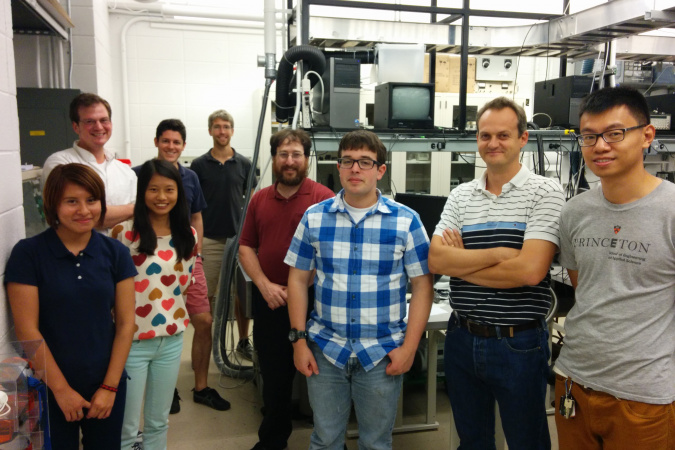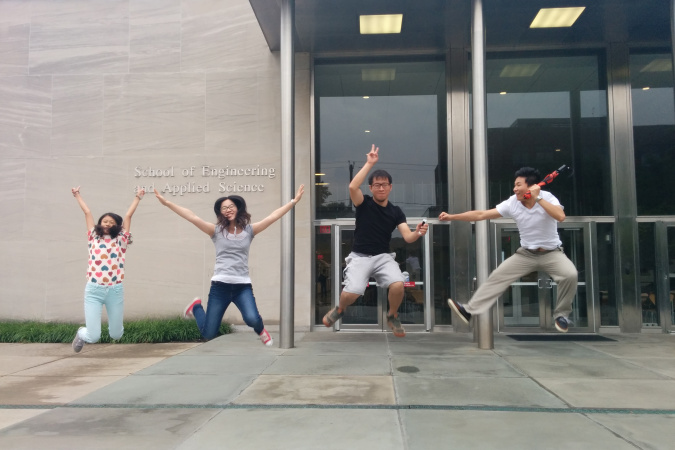Princeton 2014 Student Sharing
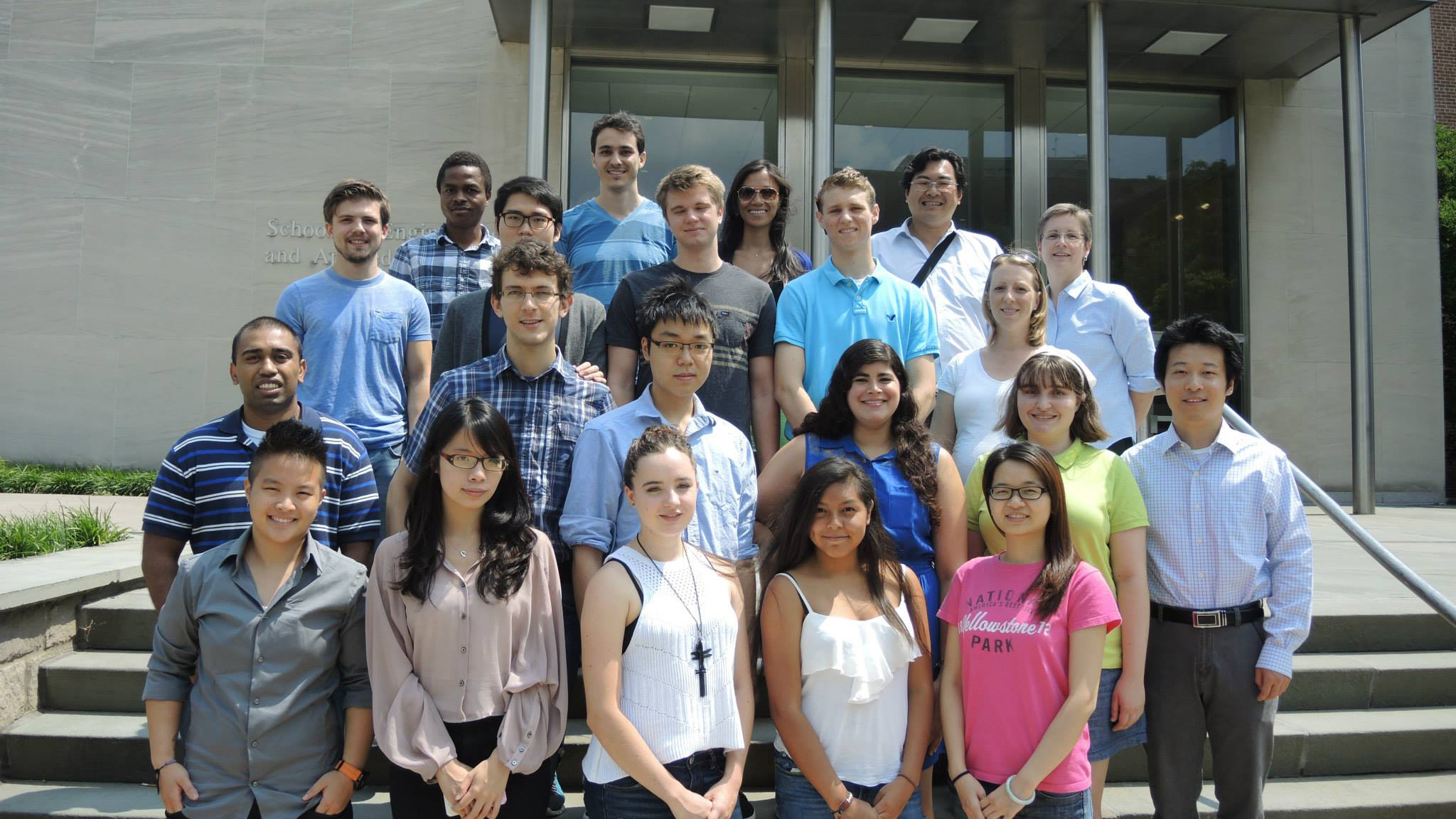
CHANG Bing-Yen (BEng in Computing Engineering)
Princeton Supervisor: Prof. Michael LITTMAN
Department: Mechanical and Aerospace Engineering
During the research program, I worked under the guidance of a Princeton University professor, Prof. Michael Littman. The first few days were mostly orientation; checking into on-campus accommodation (a 4-bedroom apartment unit with shared kitchen and bathroom), learning the various landmarks and buildings on campus, making sure our travel documents were valid and correctly entered into the USA Immigration Department database, learning about USA tax regulations, and other administrative matters. A BBQ dinner was also held, in which I met fellow students under the program and got acquainted with my professor. The next day, I attended a series of mandatory Lab Safety Trainings. Most of it was regarding chemical and laser safety, which was not immediately applicable to my research lab. Nonetheless, it was quite an interesting experience, as now I understand the reasons behind the security barriers and safety alarms surrounding the chemical and laser labs at my home institution, HKUST.
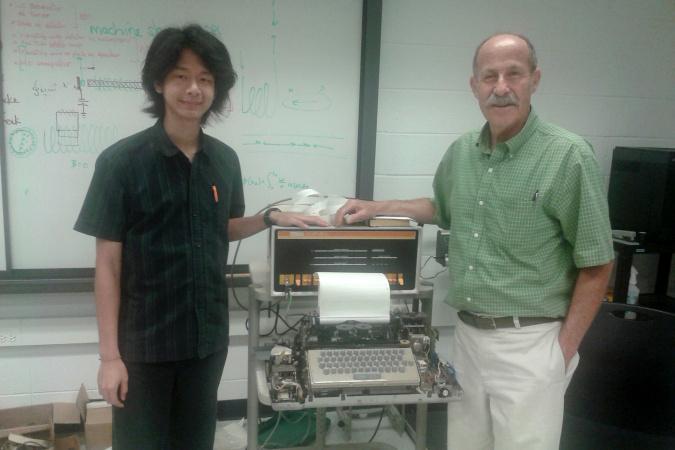
Prof. Littman gave me a tour of the Engineering Quad (Engineering Academic Building) and its underground laboratories, and introduced me to five other student researchers. All six of us worked on different individual research projects; we were only sharing a common working area. One of them was a fellow HKUST student on the same research exchange program, while the others were from various different universities in the USA. Before giving me a research topic, Prof. Littman asked me a few questions regarding my interests related to computer engineering, as he wanted his students to have enthusiasm about their research endeavors. As my interest is mostly related to software programming, and I have experience with assembly language, the professor gave me the topic of restoring an old dilapidated 1960s computer “PDP-8/L”, one of the first commercially available general-purpose desktop computer for the public. The rest of the two months revolved around restoring the computer piecemeal, systematically identifying problems, isolating their causes, and performing hardware repairs. The research project was mostly a success; the computer could start-up, run toggle-in programs (manually input short programs one instruction at a time by hand), load programs from a paper tape (paper was the storage medium before magnetic tape was invented), as well as interface with the ASR-33 typewriter and modern computers with a COM port.
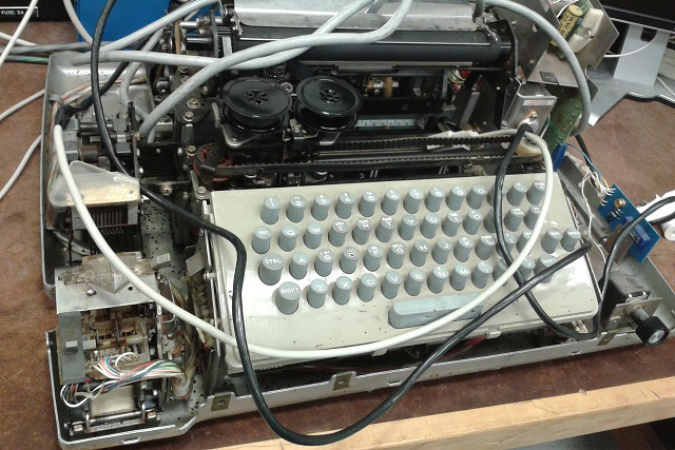
Outside of the research lab, I had also participated in other events and activities. As part of the research program, Princeton University organizes field trips to different industrial research labs for students to have a first-hand observation of the various research activities. There is also a weekly Happy Hour every Wednesday at a local bar right across the street from the Engineering Quad; every student and faculty member in Engineering is given two free drinks. I had only gone twice (once during the first week and once during the final week) as I am not particularly fond of alcoholic drinks. Before my arrival at Princeton University, I had also contacted the campus Archery Club and campus Aikido Club. The Archery Club does not have official practice during the summer months, but I got in touch with the Vice President, Ben Liu, who would give me a car-ride to the indoor archery range. We would practice together at night four times per week, and I would sometimes receive coaching from Ben and the helpful coaches. The Aikido Club still has classes as usual every Monday and Wednesday night. I had previously been learning Aikido during my high school in Malaysia, but had stopped during my studies at HKUST as there was no Aikido club. It was a welcome refreshment to be training again. Finally, I had managed to contact the campus Magic and Gathering card game club during my first weekend on campus. I joined them during their weekly gatherings.
Throughout my time at Princeton University, I have had several memorable moments. Chief among them is the USA Independence Day Fireworks at New York City on the 4th of July. It was a public holiday, and I went to explore New York City with one of my roommates. We arrived at the supposed scene of the fireworks early and waited for an hour, only to discover that this year the fireworks were held at a different area. We had to run with the rest of the crowd for around ten minutes, arriving just in time to see the last few fireworks at the correct venue. Another highlight was during a field trip to Horiba Research & Development Laboratory. Their branch in Princeton is specifically geared towards fluorescence research and applications. The researchers demonstrated several applications of fluorescence in forensics, most notably in detecting counterfeit currency and credit cards. I had brought several of my credit cards from Hong Kong, and we were all amazed by the Chinese characters that appeared when the cards were bathed in ultraviolet (UV) light. During the last week, Prof. Littman brought his students to Happy Hour. I watched as my colleagues played pool, and even joined in when they played darts. As it was my last week, my colleagues had given me an extra ticket for the opportunity to try out three different cocktails. It was the first time I had actually gotten tipsy to the point of not being able to walk straight.
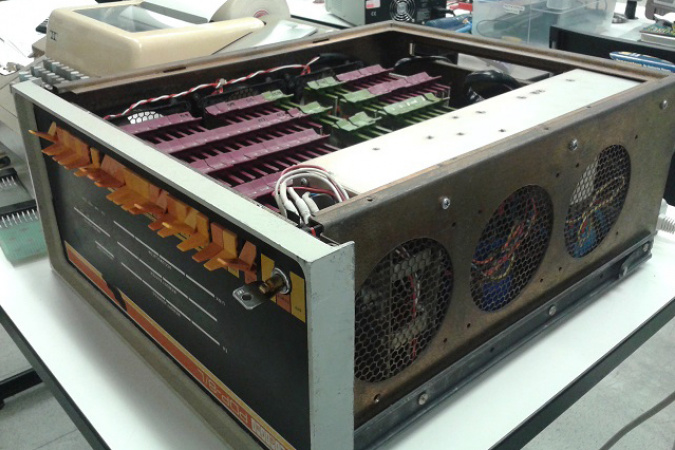
This outreaching activity was very fruitful for me, as I have gained a multitude of invaluable skills and knowledge. Under the guidance of Prof. Littman, I have gained a lot of research-based skills and experience. Repairing the computer systematically has imbued me with the knowledge of methodological problem-solving; removing variables from the problem at hand until the root cause can be found and solved. In addition, I had the opportunity to learn and utilize documentation skills, as Prof. Littman had tasked me to document all progress on his Princeton University research website. Throughout rewiring and refurbishing the computer’s faulty hardware, Prof. Littman also taught me several soldering and de-soldering techniques, as well as techniques for splicing wires together and testing the resultant connections. There were also times during the research whereby low progress was attained; these times indirectly taught me the value of determination and perseverance. Although unrelated to the research, Prof. Littman had registered me to a Mechanical Engineering Machine Tools hands-on course. I have been exposed to a whole different field, whereby I was taught how to use a machine drill and metal lathe in order to fabricate an aluminum plate with screw holes and a brass plumb-bob respectively.
After living two months in Princeton University, I have gained an interesting insight to American culture and lifestyle while immersed in their environment. Contrary to popular belief, not all Americans are liberal-minded. I have met people with very diverse views regarding liberalism and conservatism, which can be seen by their politics which emphasizes the liberal Democrats and conservative Republicans. Currently, the most prominent political issue they debate about is regarding gun laws and gun freedom. While in most countries the public is strictly prohibited from wielding firearms, in the USA it is enshrined in their Constitution that every citizen has the right to own firearms. Religion is also very entrenched in their culture; people identify themselves as either atheist or believing in religion. There are still simmering tensions between Christians, Jews, and Muslims due to the events of 9/11 and the current conflict between Israel and Palestine. This is all very new to me, as I have grown up mostly in Malaysia, not knowing much about international news. However, I also realize that these insights I’ve gained are based on the people I have met and interacted with, and thus cannot be used to generalize all American people.
Technical information regarding my research project can be found on my Princeton University documentation website.
TAN Qiao, Echo (BEng in Electronic Engineering)
Princeton Supervisor: Prof. Michael LITTMAN
Department: Mechanical and Aerospace Engineering
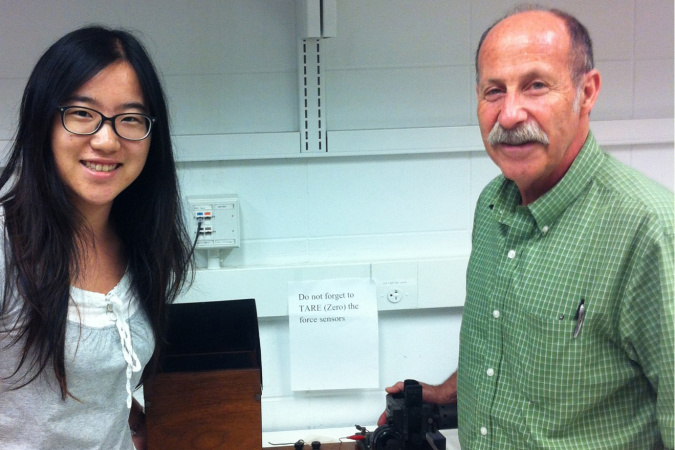
During the summer of 2014, I spent 8 weeks in Princeton University working as a research intern under the supervision of Professor Michael Littman of the Department of Mechanical and Aerospace Engineering.
During the internship program, I successively involved several different electromagnetism-related projects, where I restored an antique oscillograph (the precursor to oscilloscope) and redesigned several electromagnetic appliances, including an electric guitar pickup and a wire recorder. The projects themselves were not challenging in terms of its requirements on theoretical knowledge, but very interesting as it enabled me to get many hand-on experiences, like learning to use Creo (software tool) to design structures and using 3D printer to print different parts. Honestly, I have gained more from the working environment and my superb supervisor than from projects themselves. My colleagues in the lab were of great hospitality, helping me get familiar with the surroundings and giving me many useful suggestions. In addition to that, I have to say that Professor Littman was a passionate mentor who guided and motivated me all the way, from the very beginning of narrowing down the project focuses to resolving every single challenge we faced in the process. He was also very supportive in a way that he would visit the lab almost every day and supervise each student in flesh. I was deeply impressed and enlightened by how assiduous and dedicated an outstanding scholar was towards his research work in top US universities.
Beside work, I had an enjoyable time living and meeting with friends from different parts of the world at Princeton. During my stay in Princeton, I was accommodated in a well-furnished shared suite in Spelman Hall where living necessaries, like cooking supplies and beddings, had been already provided by Keller Center, providing great convenience upon my arrival. It became a routine for me to walk about 20 minutes every day from my apartment to the workplace, the engineering-quad building. The walk itself was very pleasant as I could appreciate the breath-taking castle-like buildings along the way. Thanks to various orientation and follow-up activities organised by Keller Center, for example, BBQ gathering, happy-hours every week and a kayaking trip, I got acquainted with people from different backgrounds in both REACH and Elab program. It turned out to be an unforgettable memory for me to kayak down the river near the campus and to cook and eat hop-pot together in the dorm on weekends.
I would like to recommend future potential participants to interact with everyone you meet at the Princeton campus especially your supervisor as much as you can. In the program, you may meet undergraduates of Princeton, interns from other universities in the US and REACH people from Germany, who may end up strengthening your with broadened international perspectives. And if your career goal after graduation is research-based, like pursuing graduate study, it will be a golden chance for you to get some taste of what your life will be, by talking to and consulting with either your supervisor or co-workers in the lab, who can give you some sincere and useful tips based on their own experiences.
Finally, I would like to acknowledge School of Engineering (HKUST) and Keller Center (Princeton University) for all the efforts devoted to this program. It was a very fruitful and memorable summer. I hope such a fabulous program can be continuously carried on in the future.
KIM Jungsun Sun (BEng in Civil and Environmental Engineering)
Princeton Supervisor: Prof. Claire GMACHL
Department: Electrical Engineering / MIRTHE
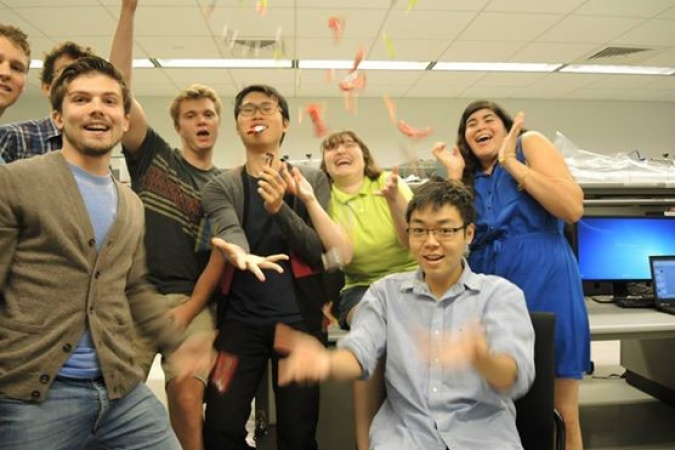
I went to Princeton University in 2014 as a research intern. I worked with Prof. Claire Gmachl and a PhD student, Mei Chai Zheng. To begin with, the exchange experience was absolutely awesome and not only enjoyable but also fruitful. First of all, I could participate in serious research projects and cooperate with a postdoc student, who is studying in Princeton. Furthermore, at the end of the program, I was able to present the research outcome in two conferences: MIRTHE Summer Workshop and International Quantum Cascade Laser Summer Workshop (IQCLSW).
Once I got to Princeton University, beautiful campus buildings and marvelous nature greeted me. I was very surprised to find fireflies everywhere! For the first few days, I went through orientation sessions and enjoyed some leisure, getting close to other UST friends. Together, we travelled around here and there and it was quite exciting. Then, I began my research. In fact, I was very nervous because my research topic was very different from my major; I am studying Civil Engineering, but my topic was about Quantum Cascade Laser. However, thanks to Prof. Claire who kindly encouraged me, I was able to go through all the difficulties and successfully finish the program. Also, Mei, a PhD student whom I worked together with, was also very helpful. I actually learnt a lot from her, not only related to research but also about my future.
In addition, the MIRTHE program provides lots of enjoyable socializing events. For example, every Thursday evening there are bar gatherings. Two free drinks and lots of snacks, which were actually quite filling, were provided. It is a great chance to make new friends and talk to staffs in Princeton as well. There are also some trips that everyone can join for free, from casual trips to Dave & Busters, a big arcade in Philadelphia, to academic trips to famous companies and labs. Personally, a trip to a plasma lab was really impressive because it was my first time to see real plasma. Beside of official events, I could enjoy canoeing with my friends at the river near Princeton. Through all of these experiences, I was able to meet many new friends with diverse backgrounds.
Overall, Princeton exchange was a great experience. Applying for this program was one of the best decisions I have ever made. If possible, I would like to go there again next year and keep working on the same topic. If anyone is seeking for great research and outreaching experiences, I would definitely recommend Princeton Summer Research Exchange without any hesitation. Do not be nervous or over worried. Keep calm and go to Princeton!
LI Jiayue Stella (BEng in Mechanical Engineering)
Princeton Supervisor: Prof. Craig ARNOLD
Department: Mechanical and Aerospace Engineering
In the summer of 2014, I got a precious opportunity to participate in the two-month’s research program at Princeton University. I was working with Professor Craig Arnold’s group in the Department of Mechanical and Aerospace Engineering. Our group focuses on material processing and more specifically my work was to study the laser-induced dewetting phenomenon of noble metal film. We have observed interesting patterns made by dewetting, and we were hoping to find the best combination of the affecting parameter to produce the pattern we desire.
Working with Arnold’s group was a really enjoyable experience. One of the interesting spots in our group is that our group had an incredible cultural diversity. Other than the U.S., we had people from Brazil, Spain, Switzerland, mainland China, Taiwan, Korea and also South America. Most people did not speak English as their first language and we had completely different cultural backgrounds. During the working period in the group, we had a great time talking about different cultural traditions and experiences in other nations. Working with this group in Princeton University, I felt both warm and excited.
During the time in Princeton, I experienced how a project starts up from literature reading, experimental set up comparisons, designing experiments, purchasing and calibrating equipment and eventually came to the stage of collecting data. This was nothing like the experiments done in class for demonstration. There was no lab menu and no instruction which, on the one hand, gave me almost the absolute freedom to do what I wanted, while on the other hand, made it a great challenge to make good use of the equipment and producing useful data during the limited time. Our group members were helping me a lot with the technical part and I have acquired more than just knowledge but also how to interact and cooperate with group members and people from other related areas. Learning from these amazing people, I have been trained a lot on both academic and group work skills through this two-month experience in Princeton.
The overall experience in Princeton was fabulous and memorable. I have experienced a lot and learnt a lot. Many thanks to Keller Center and School of Engineering that helped me to such a great program and my dear professor and group members who were always there helping me out.
LI Xiang Leon (BEng in Electronic Engineering)
Princeton Supervisors: Prof. YAO Nan
Department: PRISM - Imaging Analysis Center
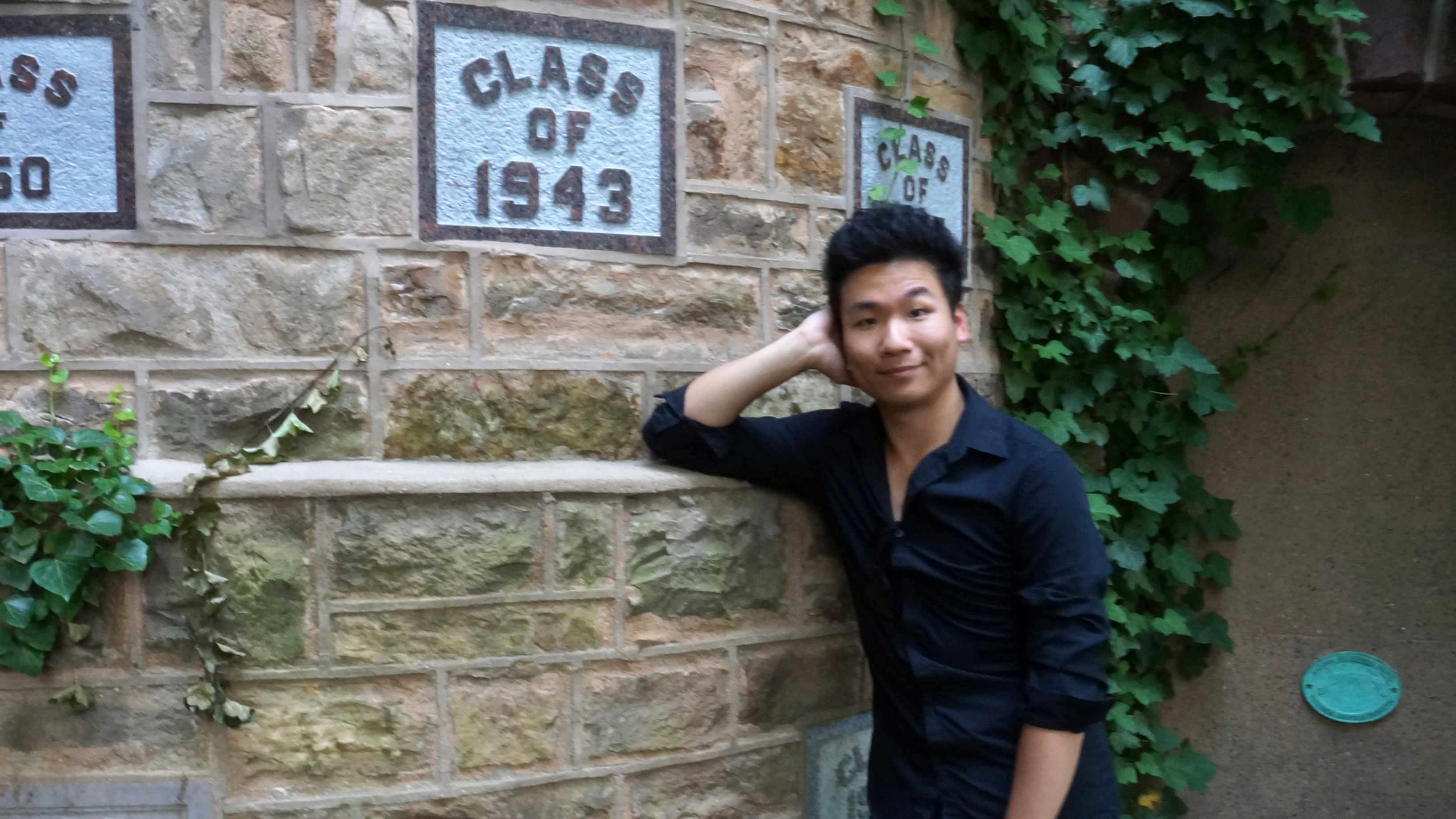
Thanks to this precious opportunity offered by HKUST School of Engineering, I am able to participate in an international research exchange program, in which I stayed in Princeton – a world class university famous for its pursuit of cutting-edge research and high quality education – for eight weeks and conducted a fully engaged research under the supervision of a Princeton faculty.
Just like HKUST, Princeton is definitely an outstanding and research focused university. It has one of the most inviting and comfortable living environments, not to mention a history of over two hundred years and a beautiful campus. Settled in this peaceful and enjoyable environment is a university that puts great emphasis on research and education. Indeed, Princeton has some of the best faculty members around the world, and they share the same dedication in both active teaching activities and serious research projects. Apart from that, the student body on campus enjoys a perfect mixture of excellent students from all around the world. Taking advantage of this condition, Princeton also encourages communication between students of different cultural and educational backgrounds by organizing various gatherings, parties and seminars. These greatly increased our opportunity to interact and exchange ideas with other students.
Princeton is well known for its excellent research and teaching practices. Indeed, Princeton has all the equipment and facilities needed to provide its students with a comfortable and inviting environment for acquiring knowledge and conducting research. I have been conducting an eight-week research under the guidance of a supervisor who also happened to be the person in charge of a local research center. He is a senior research scholar and a passionate lecturer, and he is among the top most cited google scholars in the world of nano-technology and electron microscopy. On the very first day, he assigned us to a topic, which neither I nor my teammates were familiar, on a special phenomenon observed in STEM images. What really puzzled me was the breadth and depth of the topic that has never been attempted before.
That was when our supervisor showed his capability in providing guidance and direction. During our appointments, he gave us crucial keywords and essential terminologies mentioned in previous papers. He suggested we start with literature research by taking advantage of Princeton’s database and Google Scholar based on the keywords he provided. It was a really frustrating process to start with, since we have to build our knowledge starting from scratches while we dove into literature research. However, the process was rewarding as we continued to advance, because each “Oh! I get it” moment would add to our understanding of the working principle of STEM and reinforce our foundation for later experiments.
Meanwhile, our hands were kept dirty by trainings and hands-on experiences. We were lucky enough to be trained to understand the operation of SEM and other sophisticated equipment, and we got the chance to operate for ourselves those advance machines and observe objects at submicron scale.
Later in our research, we established a well-designed procedure of research on our own – problem identification, theoretical induction, mathematical calculation, computer simulation, experiment proof and final explanation. In a short eight weeks, we accomplished the entire process, including paper drafting and revision. When the program came to an end, we gave a presentation in great detail on our discoveries and results, and the things we have learnt, either research related, academic or presentational, are so immense, and I believe they will continue to benefit me in further research and study.
Looking back on the eight weeks at Princeton, I must say I really enjoyed the process of discovering and practicing what I had learnt in real world cases. The research project entailed a combination of mathematical, theoretical, programming, hardware and writing skills, all of which I’ve learnt directly or indirectly from my previous studies. The result is definitely rewarding, and it has gone beyond my expectations as I got the chance to publish a paper as the first author and receive a recommendation letter from a well-known faculty member. Besides that, I also received valuable advices from my advisor, reminding me of the value of PhD study and what research is really about. That reinforced my determination in applying for graduate school and take the course of research as my possible future career.
In conclusion, a time span of eight weeks is short for an entire research topic, but long and intensive enough to stimulate my interest in research and serve as a starter for my research career.
SUN Lei (BEng in Computer Science)
Princeton Supervisors: Prof. YAO Nan
Department: PRISM - Imaging Analysis Center
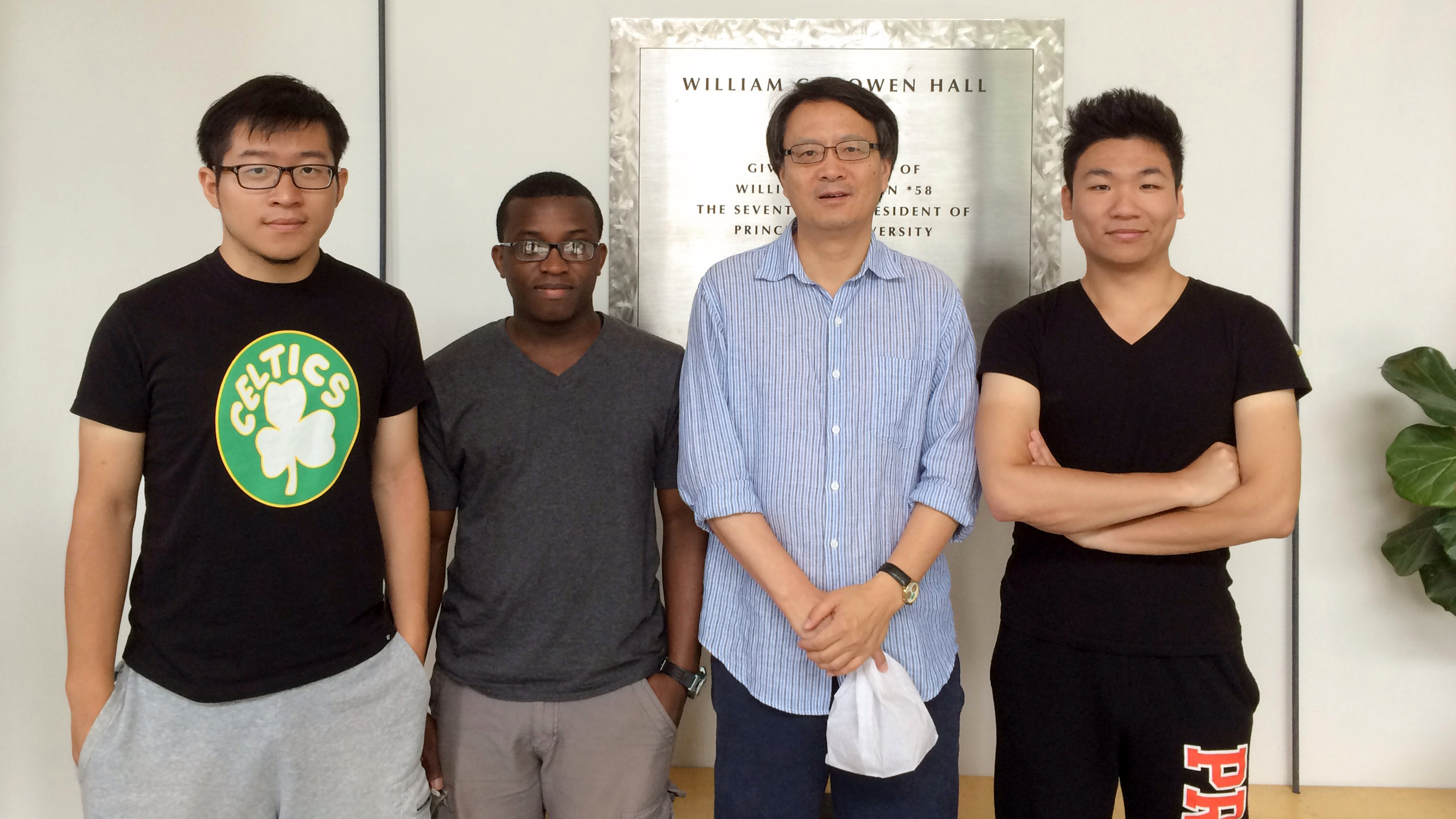
In a big picture, Princeton University, or the town itself, is like a castle with modern infrastructures properly located. When I first arrived at the small town I could hardly resist its great peace and romantic atmosphere. Centralized with the historical universities, the famous town was lively but not crowded. I prefer to describe the town as a big garden. Citizens here, much to my surprise, would definitely recognise you when wearing a Princeton T-shirt, walking along the street and they enthusiastically provide assistance if necessary.
Our enrolled program is called REACH, it is a research project specially designed for foreign students who are willing to gain research experience cooperated with Princeton professors and other research students from REU and eLab, another two fantastic programs run by our host, Keller Center of Princeton University. It’s not like the summer session as you may have heard from other students, the word “research” is emphasised to an even overwhelming extent. The word means only collecting and understanding the existing knowledge is not enough, but to expand the border of the knowledge. Specifically, my project is a collaborative task with another student to start from theoretical analysis of a microscope’s physical process to propose some reasonable explanation for aberrant phenomenon, which is observed from a famous paper's figure, and then to test the conjecture with tools available. To achieve the goal, training sessions in terms of experimental skills were taken along the way. The most challenging part about the project is that the background knowledge required to finish the task is more about theoretical physics but not my major which is computer science. With time being limited, it was expected for us to finish the previous relevant paper reading within one to two weeks. You can never manage to dig in depth into a rigorous subject in that short period of time, so finding the part that was really necessary and feasible for rookies to get command of was crucial. That is to mean you will be required to find the information among all the unfamiliar words for any new terminologies. I never regarded this as an important technique before, but the Professor emphasised that it is quite common to come across new set of terminologies during the research paper reading.
During the process of handling the experimental problems we were lucky to gain valuable support and assistance from PhD students and research associates in the lab. It is not all about the academic contents themselves, but incentives to further study in graduate school as well. I asked for the reason why they choose to chase for doctor’s degree even though it is not the best way to earn a living in the states. The reasons varied but they agreed to the idea that it is worthwhile to spent 5-6 years if you are really enthusiastic in science and technologies. I may not continue to study in graduate school as a PhD student but their determination still impressed me a lot. I have thanked my supervisor Dr. Nan Yao, who is a great research scholar and who gave a lot of insightful advice about my future plan.

